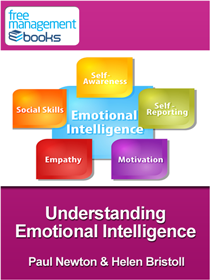Understanding Emotional Intelligence - Free eBook in PDF Format
 |
 |
|
Book Description - ISBN 978-1-62620-967-1 (50 Pages)
This free eBook explains why managers across the globe have embraced emotionally intelligent leadership, an idea that is now used routinely in almost all businesses and professional training programs. Successful management is all about getting work done through other people, some of whom you have no direct authority over. This is directly correlated to your success in self-awareness, self-management, and social awareness, all of which are essential elements of emotional intelligence.
Chapter 1 - Understanding Emotional Intelligence
Daniel Goleman popularized the term 'Emotional Intelligence' in 1995 in the title of his bestselling book, Emotional Intelligence: Why it can Matter More than IQ. Goleman defined emotional intelligence as 'Understanding one's own feelings, empathy for the feelings of others and the regulation of emotion in a way that enhances living.' Not everyone agrees with Goleman's model of emotional intelligence, but there is general agreement that emotional intelligence exists, that it is a factor in personal and professional success, and that it can be improved.
Chapter 2 - Goleman's Model of Emotional Intelligence
Goleman's model is the most widely used when discussing EQ in the context of the workplace. It describes EQ in terms of five domains that are split into four quadrants. Two of the domains are related to personal competence and two are related to social competence.
Chapter 3 - Emotional Quotient (EQ) and IQ
Most of the early research on intelligence focused on problem solving and other things that were easy to measure. However, it has long been accepted that other factors are essential for predicting someone's ability to succeed at work and in life. Salovey and Mayer defined these as 'a form of social intelligence that involves the ability to monitor one's own and others' feelings and emotions, to discriminate among them, and to use this information to guide one's thinking and action.'
Chapter 4 - Emotional Intelligence and Management
The publication of Goleman's book Emotional Intelligence in 1995 marked the beginning of emotional intelligence as something that was recognized by mainstream business theorists and writers.
Chapter 5 - Emotional Intelligence Timeline
The work of the Consortium for Research on Emotional Intelligence (EI) in Organizations has identified five key research studies that support the importance of an individual's emotional and social skills as important for success at work.
Chapter 6 - Can Emotional Intelligence be Developed?
The theory of emotional intelligence is popular because it implies that EQ can be developed. This is not universally accepted, but research has supported the idea that emotional intelligence competencies can be significantly improved over time.
Chapter 7 - Emotional Intelligence and Personal Competence
The development of your emotional intelligence can be divided into personal and social competencies. Personal competence is made up of self-awareness and self-management. Self-awareness is the ability to recognize your own emotions and their effects on your self and other people. Self-management builds on your self-awareness, using your own self-control to ensure your emotions don't control you regardless of the situation.
Chapter 8 - Emotional Intelligence and Social Competence
Social competence is made up of social awareness and relationship management. Social awareness competencies include empathy, organizational awareness, and service orientation. Relationship management competencies include influence, leadership, developing others, communication, change catalyst, conflict management, building bonds, and teamwork and collaboration.
Chapter 9 - Emotional Intelligence Framework
The theory of emotional intelligence is popular because it implies that EQ can be developed and improved. This is not universally accepted but research has supported the idea that emotional intelligence competencies can be significantly improved over time.
| You will learn: |
|
Emotional Intelligence in the Workplace - To develop your emotional intelligence in the workplace you must be willing to openly and honestly reflect on your own performance and behavior. Your long-term success relies on you making this an iterative process throughout your career.
Avoiding Stress at Work - Everyone has their unique level of over-commitment that leads to stress at work. Knowing when you are approaching this level and taking positive steps to keep control are key to maintaining your performance and productivity. You need to be aware of your stress symptoms.

